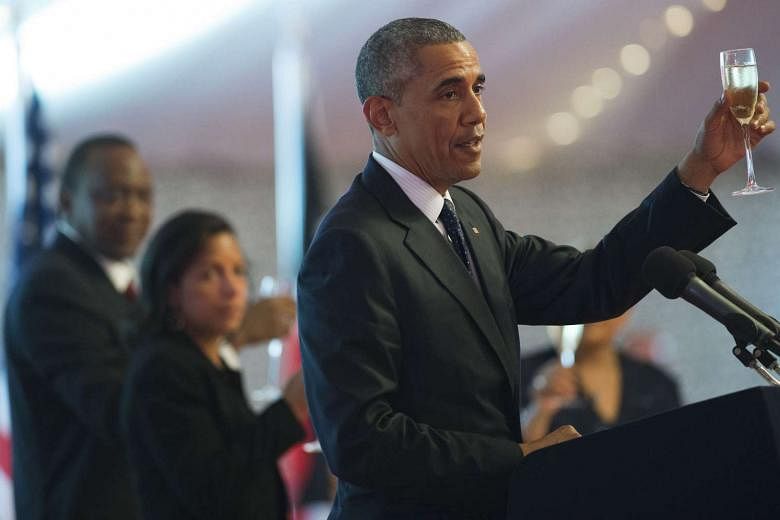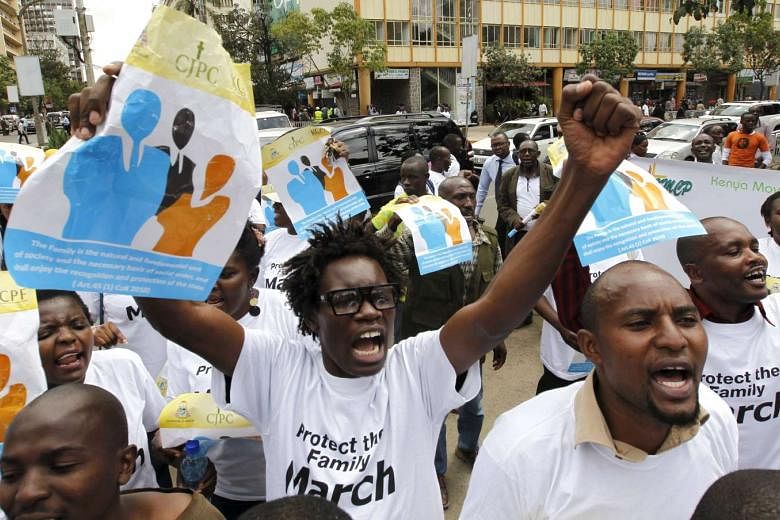NAIROBI (AFP) - US President Barack Obama on Saturday called for gay rights in Africa during his landmark visit to Kenya, comparing homophobia to racial discrimination he had encountered in the United States.
In a joint press conference after talks with Kenyan President Uhuru Kenyatta, Obama also pushed a tough message on Kenyan corruption, the civil war in South Sudan, controversial elections in Burundi and the fight against Somalia's Al-Qaeda-affiliated Shebab militants.
Obama arrived in Kenya on Friday, his first visit as president to his father's birthplace and the first to the East African nation by a serving US leader.
"I've been consistent all across Africa on this. When you start treating people differently, because they're different, that's the path whereby freedoms begin to erode. And bad things happen," he said after talks with the Kenyan leader, in response to a question on gay rights.
"As an African-American in the United States I am painfully aware of what happens when people are treated differently under the law. I am unequivocal on this," Obama told a joint news conference, openly disagreeing with Kenyatta.
He said that the notion "a law-abiding citizen... will be treated differently or abused because of who they love is wrong, full stop."
Homophobia is on the rise in Africa, and espousing evangelical Christian values is a major vote winner in many countries.
Kenyatta replied by repeating the view that gay rights were "a non-issue."
"There are some things that we must admit we don't share. It's very difficult for us to impose on people that which they themselves do not accept. This is why I say for Kenyans today the issue of gay rights is really a non-issue," Kenyatta said.
A presidential visit to Kenya had been delayed while Kenyatta faced charges of crimes against humanity for his role in post-election violence seven years ago.
The International Criminal Court (ICC) has since dropped the case, citing a lack of evidence and accusing Kenya of bribing or intimidating witnesses.
'GET TOUGH ON CORRUPTION'
Kenyan Vice-President William Ruto, whose ICC trial continues, is also vocally homophobic and recently described gays as "dirty". Obama nevertheless shook his hand on arrival at State House.
Obama also had firm words for Kenya on civil rights and corruption, describing endemic graft as "the single biggest impediment to Kenya growing even faster," and saying people were being "consistently sapped by corruption at a high level and at a low level."
Obama said there was a need for "visible prosecutions" to show citizens action was being taken.
"They don't have to be a forensic accountant to know what is going on," Obama said, giving the example of officials driving expensive cars or building houses far above what their salaries would allow.
The two leaders also pledged greater cooperation against Somalia's Shebab, who have also been at the top of the list of security concerns during the visit.
Nairobi has witnessed massive security operations involving at least 10,000 police officers, with parts of the usually traffic-clogged capital locked down until Obama's scheduled departure late Sunday for neighbouring Ethiopia.
Shebab fighters have staged a string of suicide attacks and bombings on Kenyan soil, including the April massacre at Garissa university, in which 148 people died, and the 2013 assault on the Westgate shopping mall in central Nairobi that killed 67.
"We have systematically reduced the territory that Al-Shebab controls. We have been able to decrease their effective control within Somalia and have weakened those networks operating here in East Africa. That doesn't mean the problem is solved," Obama said.
Earlier, Obama laid a wreath at the memorial site of the former US embassy destroyed in an Al-Qaeda attack in 1998, standing in silence in memory of the 224 killed in the twin bombings in Nairobi and Tanzania.
He wrapped up the evening with a state dinner with Kenyatta, with the atmosphere lively and friendly.
'AFRICA ON THE MOVE'
Obama also called for an end to the 19-month-old civil war in South Sudan, urging the country's warring leaders to "put their country first."
The conflict there is set to be high on the agenda for the next stage of his visit to Ethiopia, also the seat of the African Union.
This week's elections in the central African nation of Burundi, which delivered a controversial third term to President Pierre Nkurunziza, "weren't credible," Obama said.
Despite the areas of disagreement, the president said he was delighted to be back and praised Africa's entrepreneurship at a business summit earlier Saturday.
"It is wonderful to be back in Kenya," Obama said. "Obviously this is personal for me. My father came from these parts."
Barack Obama Sr was a pipe-smoking economist who the US leader has admitted he "never truly" knew. He walked out when Obama was just two and died in a car crash in Nairobi in 1982, aged 46.
Obama still has extended family in western Kenya, who he dined with on Friday evening.
"I wanted to be here, because Africa is on the move, Africa is one of the fastest growing regions in the world," he said, drawing cheers and applause from delegates.
"People are being lifted out of poverty, incomes are up, the middle class is growing and young people like you are harnessing technology to change the way Africa is doing business."
He also vowed to return, sketching plans for philanthropic work once he leaves office.
"The next time I'm back, I may not be wearing a suit," he joked.


